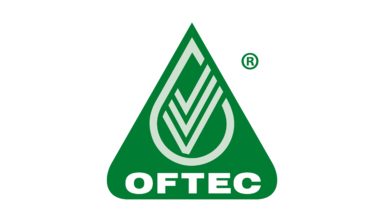
Why should I join OFTEC?
For installers in England, Wales, the Channel Isles and Isle of Man, there are three ways to meet building regulations regarding fitting liquid fuel boilers, tanks, etc:
- Paying an approved inspector to validate compliance
- Paying the local authority to sign off, or
- Joining a government-licensed competent persons scheme (CPS) and simply notifying the local authority of your installations via a recognised system
Which route you choose will be dictated by the cost versus the perceived benefits of joining a scheme. Technicians installing more than three installations per year will find CPS registration cheaper than paying a local authority. Both installers and service technicians value the technical helpline. Many appreciate receiving regular technical and industry updates, discounts on small business support services or access to fuel cards.
Others will simply value using a logo with 30-plus years of brand recognition on their van, and an entry on OFTEC’s online business listing that received over 150,000 searches last year. Not a direct benefit to a technician maybe, but did you know that each notified installation carries a six-year consumer protection warranty, should you have to close your business. Not something you want to think about, but this cover for your customer may just win you work over the competition.
What is a competent person scheme?
Competent Person Schemes (CPS) were introduced by the UK Government to allow individuals and enterprises to self-certify that their work complies with the Building Regulations as an alternative to submitting a building notice or using an approved inspector.
A competent person must be registered with a scheme that has been approved by government. Schemes authorised by the Government are listed on its website at https://www.gov.uk/guidance/competent-person-scheme-current-schemes-and-how-schemes-are-authorised. (www.gov.uk)
Why does registration cost so much?
OFTEC is a not-for-profit organisation. As with any business we have operational costs and must charge accordingly. We try to strike a balance between offering appropriate levels of service and keeping fees low. Our accounts are independently audited as required by our government conditions of authorisation and our registration scheme finances is independently scrutinised by an impartiality committee.
This impartiality committee is made up of industry experts including LABC, Building Safety Regulator, manufacturers, training centres and is not dominated by OFTEC as the name suggests. Our accounts are independently audited and monitored. We believe we offer very competitive rates for registration services compared to other schemes.
Who makes the rules at OFTEC?
The OFTEC registration scheme, together with other government recognised schemes is listed on Schedule 1 of the Building Regulations &c. (Amendment) Regulations 2015 and operated under licence from the Building Safety Regulator. We must comply with 21 operational conditions – called Conditions of Authorisation – designed with the objective of ensuring registrants operate in a manner that delivers on the functional requirements of the building regulations and ensures safety and protection of buildings and the public.
Our methods of meeting compliance with the conditions are scrutinised and agreed with an impartial scheme committee, which is made up of representatives from across the heating, building, policy and education sectors. A little-known fact is that to maintain impartiality, together with everyone else, OFTEC only has a single vote on that committee. This ensures that decisions made are for the benefit of industry and not just OFTEC.
Why can’t OFTEC books and report pads go digital?
For many years, OFTEC has been acutely aware that technicians have been asking for digital materials. Our previous research suggested that registrants are split on this subject. Certainly, the published material can be beneficial in a training and assessment environment. However, we know that for quick reference, digital material is preferred in the field.
Technicians visiting training centres from the second week of September will see that we have now developed a modular A4 binder that can be tailored to the training package required. This is environmentally sound because it significantly reduces paper and print, and still satisfies ease of referencing during training and assessment. For field applications, we are currently in the latter stages of preparing a digital field guide, which will be free to registrants and accessed via your technician portal.
Regarding digital pads, we are currently speaking to a partner to take the pads digital and will update soon.
Who writes OFTEC assessments?
It’s generally thought that when a new OFTEC assessment scheme is put together, it’s simply a group of OFTEC employees who write the training syllabus and assessment papers. In fact, it’s done by a working group, which will include manufacturers, industry experts, assessment centres, certification bodies, and anyone else we think can assist. This group will make sure that assessments are written to cover minimum technical competencies before they are trialled, and pilots held, to identify any issues before they are launched.
OFTEC does not run assessment centres. The centres we work with are all either independent training providers, colleges, or manufacturers. The assessment process is monitored by certification bodies, who are accredited by the United Kingdom Accreditation Service (UKAS) to ISO 17024 standard. It’s the certification body who issues the certificate of competence, not OFTEC, which ensures impartiality. We work with seven different certification bodies, and it is the choice of the assessment centre as to which one they work with.
Has OFTEC turned its back on the oil industry?
Certainly not. Since the publication of the UK Clean Growth Strategy, OFTEC has invested several hundred thousand pounds fighting the proposal to cease the installation of oil boilers post 2026 and prolonging the skills and careers of the oil heating technician.
This money has been used for specialists to evaluate different low carbon liquid fuel alternatives to kerosene, laboratory combustion trials, extensive field trials, sustainability studies, technical evaluation on materials, political lobbying and other essential work. We are optimistic that HVO will be the energy source to displace kerosene in the majority of off gas grid homes and liquid fuel heating will remain our core business.
Why is OFTEC spending time on heat pumps?
Like it or not, heat pumps will play a significant role in heating homes in the future. Government policy is committed to supporting them and a previous Prime Minister predicted 600,000 heat pumps will be installed annually by 2028. We can debate all day whether this is likely to happen and how many will actually displace oil boilers.
The important thing is that technicians are offered choice over the direction they want to take their businesses. Some take the view that oil will see them into retirement, but others are diversifying and already work hard to win these renewable installations. OFTEC is currently positioning itself to offer technicians choice and a one-stop-shop for technicians wishing to extend their technology offering whilst staying on the OFTEC register.
Why is OFTEC giving away money for heat pump training?
OFTEC is one of a number of businesses that are facilitating the upscaling of a heat pump trained workforce. The money comes from central government and is part of a scheme to lessen the cost of training for installers. It is the training centre that ultimately receives the money, which is channelled via OFTEC for record keeping and audit purposes. Any money not spent during the life of the scheme is returned to government.
OFTEC’s interest in this project is that we hope candidates passing through the centres will return to OFTEC and enter registration to install and notify heat pumps.
Why have I been inspected more than other technicians I know?
Under the conditions of our licence to operate, we must conduct surveillance on registered businesses and technicians. The frequency of surveillance is based upon risk. All new businesses must have an initial on-site assessment. Some scopes require assessment before joining, but all will be assessed upon joining.
Following the initial assessment, all businesses are then subject to a further two consecutive annual inspections. The frequency is then extended to one inspection at approximately five yearly intervals, subject to the business being awarded a clean assessment record, and OFTEC not receiving any complaints or other evidence that suggests the business is operating non-compliantly.
OFTEC occasionally receives feedback that inspectors are not flexible when reporting on building regulations compliance. OFTEC uses independent contracted inspectors. They are all experienced in running their own heating businesses and know very well the pressures and challenges that technicians face daily.
Building regulations guidance is in place to protect buildings and the public and this is the measure of whether something is correct or not. It is not in the hands of the inspector to say whether something that is “near enough” is good enough. The expectation of OFTEC is to determine if something is correct or not. Likewise, whether a technician is competent or not.
Why doesn’t OFTEC act against bad installations?
This is a common enquiry received and we share the frustration.
No registration scheme has legal powers to enter a property uninvited or force the correction of non-compliant installation work. We are only able to impose corrective actions on our own registrants and a failure to make good will result in registration first being suspended and then withdrawn.
We publish in Oil Installer all businesses where we have taken that action and we work with trading standards if technicians continue to use the logo and portray themselves as being OFTEC registered.
OFTEC supports the ideal that greater surveillance must be exercised by local authorities and fines should be imposed on anyone conducting work that does not comply with building regulations.
Why aren’t technicians listened to?
The technical and registration teams deal with hundreds of calls and emails every week. We are actively engaged across social media platforms and have recently started hosting or participating in webinars. We are always open to constructive feedback and your ideas to make OFTEC better and your lives easier, so we invite you to email us or pick up the phone.
On this very topic, we are considering running a series of interactive “Ask us anything” events and would welcome your input on whether this would be useful? Is there a preferred time of day or preferred platform that would work best for you?
